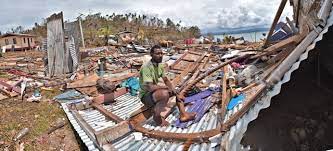Climate change is a contributor to poverty in Fiji, says Pacific Islands Forum director programmes and initiatives Zarak Khan.
He made the comment in a World Bank Report on Archipelagic Economies.
Khan said Fijians had lost income when their resources and sources of income were damaged by natural disasters caused by climate change.
“I’ve got relatives living in Nabouwalu in Fiji and Vanua Levu whose houses were blown away after the last cyclone hit in January this year,” he said.
“And for them, they work in the agricultural sector, they’re farmers and they’re not high-income earners.
“They don’t have a big pot of savings, for example, to suddenly tap into and rebuild the houses and get the farms back in order.”
Khan said the recent report released by World Bank – Archipelagic Economies: Spatial Economic Development in the Pacific – also showed that rural poverty had increased.
“It has increased quite a bit, particularly because of the frequent cyclones that are coming into the country.”.
Meanwhile, as Fiji seeks more green climate funding, the Government has been urged to create more career opportunities in the field of climate change.
Former University of the South Pacific and University of Fiji academic, Dr Anirudh Singh, said there was a mismatch between the government’s climate change policies and future plans.
He made the comments after the passing of the Climate Change Act into law last week that allows Government to maintain a Green Climate Fund, money that will be used for the implementation of measures for mitigation and adaptation to climate change with the approval of the minister in charge of climate change.
“There is an urgent need for new career opportunities in the fields of climate change mitigation and adaptation, carbon emissions and trading, renewable energy technologies and energy-efficient transportation,” Dr Singh said.
He said if Fiji wanted to abide by its commitments to the Paris Agreement, then it needed to create new jobs.
“There is a mismatch between the Government’s climate change policies and intentions on the one hand and its actions on the other.
“While it is actively seeking more green funding, there is insufficient effort to create the human resource infrastructure in the country that can facilitate the mobilisation of such funds.”
Dr Singh said the Government should make concerted efforts to create career paths that take our young graduates from universities “to fruitful and worthwhile careers” in these new areas of global climate change, energy access and the environment.
SOURCE: FIJI TIMES/PACNEWS














